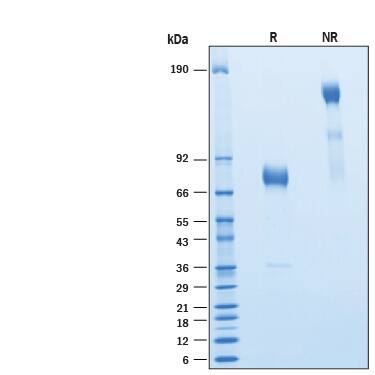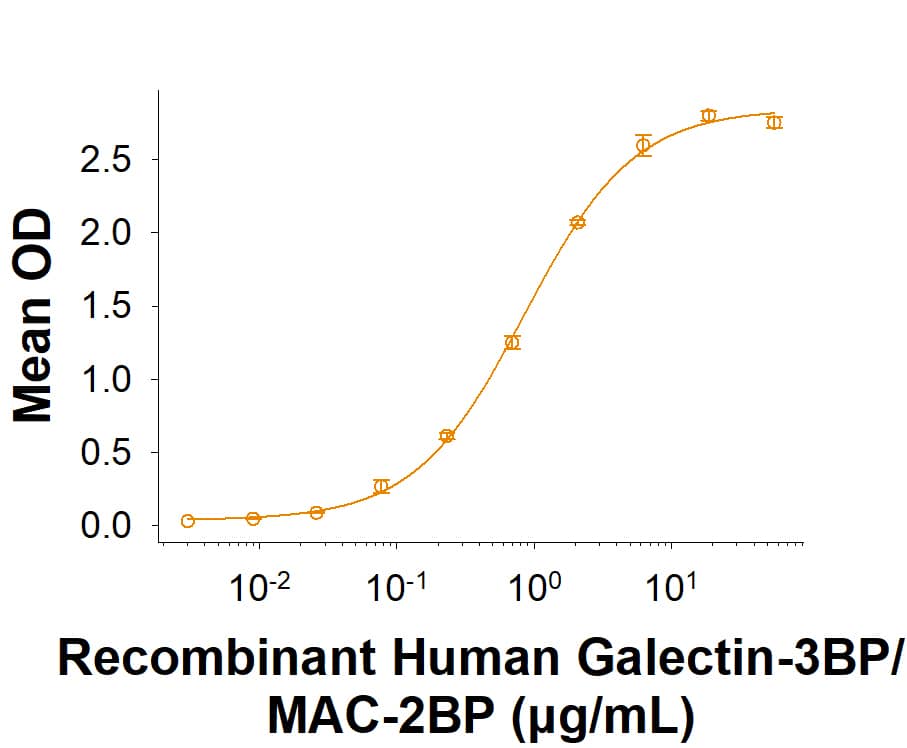Recombinant Cynomolgus/Rhesus Siglec-3/CD33 Fc Protein, CF
R&D Systems, part of Bio-Techne | Catalog # 10885-SL

Key Product Details
Source
CHO
Accession #
Structure / Form
Disulfide-linked homodimer
Conjugate
Unconjugated
Applications
Bioactivity
Product Specifications
Source
Chinese Hamster Ovary cell line, CHO-derived Siglec-3/CD33 protein
| Cynomolgus Monkey/Rhesus Macaque Siglec-3/CD33 (Met16-Gly248) Accession # XP_045235686.1 |
IEGRMD | Human IgG1 (Pro100-Lys330) |
| N-terminus | C-terminus |
Purity
>95%, by SDS-PAGE visualized with Silver Staining and quantitative densitometry by Coomassie® Blue Staining.
Endotoxin Level
<0.10 EU per 1 μg of the protein by the LAL method.
N-terminal Sequence Analysis
Met16
Predicted Molecular Mass
52 kDa
SDS-PAGE
68-79 kDa, under reducing conditions
Activity
Measured by its binding ability in a functional ELISA.
When Recombinant Cynomolgus Monkey/Rhesus Macaque Siglec-3/CD33 Fc Chimera (Catalog # 10885-SL) is immobilized at 1 µg/mL (100 µL/well), Recombinant Human Galectin-3BP/MAC-2BP (Catalog # 2226-GAB) binds with an ED50 of 0.15-1.20 µg/mL.
When Recombinant Cynomolgus Monkey/Rhesus Macaque Siglec-3/CD33 Fc Chimera (Catalog # 10885-SL) is immobilized at 1 µg/mL (100 µL/well), Recombinant Human Galectin-3BP/MAC-2BP (Catalog # 2226-GAB) binds with an ED50 of 0.15-1.20 µg/mL.
Scientific Data Images for Recombinant Cynomolgus/Rhesus Siglec-3/CD33 Fc Protein, CF
Recombinant Cynomolgus Monkey/Rhesus Macaque Siglec‑3/CD33 Fc Chimera Protein Binding Activity.
When Recombinant Cynomolgus Monkey/Rhesus Macaque Siglec-3/CD33 Fc Chimera (Catalog # 10885-SL) is immobilized at 1 µg/mL (100 µL/well), Recombinant Human Galectin-3BP/MAC-2BP (2226-GAB) binds with an ED50 of 0.15-1.20 µg/mL.Recombinant Cynomolgus Monkey/Rhesus Macaque Siglec‑3/CD33 Fc Chimera Protein SDS-PAGE.
2 μg/lane of Recombinant Cynomolgus Monkey/Rhesus Macaque Siglec‑3/CD33 Fc Chimera Protein (Catalog # 10885-SL) was resolved with SDS-PAGE under reducing (R) and non-reducing (NR) conditions and visualized by Coomassie® Blue staining, showing bands at 68-79 kDa and 140-160 kDa, respectively.Formulation, Preparation and Storage
10885-SL
| Formulation | Lyophilized from a 0.2 μm filtered solution in PBS with Trehalose. |
| Reconstitution | Reconstitute at 500 μg/mL in PBS. |
| Shipping | The product is shipped at ambient temperature. Upon receipt, store it immediately at the temperature recommended below. |
| Stability & Storage | Use a manual defrost freezer and avoid repeated freeze-thaw cycles.
|
Background: Siglec-3/CD33
References
- Bhattacherjee, A. et al. (2021) Mol. Neurodegener. 16:19.
- Murch, S. et al. (2020) Medical Hypotheses. 144:110168.
- Hernandez-Caselles, T. et al. (2019) J. Immunol. Res. 2019:6032141.
- Hernández-Caselles, T. et al. (2006) J Leukoc Biol. 79:46
- Malik, et al. (2013) J. Neurosci. 33:13320
- Paulson, J. et al. (2012) Ann. N. Y. Acad. Sci. 1253:37.
- Wang, S. et al. (2021) Front Mol. Biosci. 8:645999.
- Laubli, H. et al. (2014) J. Biol. Chem. 289:33481.
Long Name
Sialic Acid Binding Ig-like Lectin 3
Alternate Names
CD33, gp67, Siglec3
Gene Symbol
CD33
UniProt
Additional Siglec-3/CD33 Products
Product Documents for Recombinant Cynomolgus/Rhesus Siglec-3/CD33 Fc Protein, CF
Product Specific Notices for Recombinant Cynomolgus/Rhesus Siglec-3/CD33 Fc Protein, CF
For research use only
